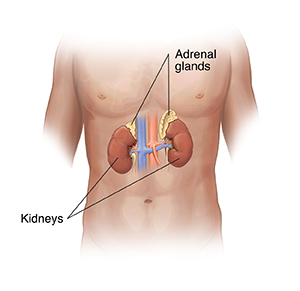Understanding Primary Aldosteronism
Primary aldosteronism (PA) is a hormone disorder. It occurs when the adrenal glands make too much of the hormone aldosterone. The adrenal glands sit at the top of the kidneys. They also make other hormones, such as cortisol.
Aldosterone helps control the levels of sodium and potassium in the body. When you have too much of this hormone, your body builds up sodium and may lose potassium. Too much sodium can cause your blood pressure to rise. PA often leads to high blood pressure.

How to say it
PRI-mer-eee
al-DOH-steh-roh-NIHZ-ehm
What causes primary aldosteronism?
The most common cause of PA is a benign tumor on 1 of the adrenal glands. This condition is called Conn syndrome.
PA may also occur when 1 or both adrenal glands are overactive. They make too much aldosterone. In rare cases, a genetic disorder or cancer may cause PA.
Symptoms of primary aldosteronism
PA often may not cause any symptoms. The only sign may be high blood pressure. People with PA often have to take 3 or more medicines to control their blood pressure levels. Blood tests may also show high levels of sodium and low levels of potassium in the body.
Some people with PA may also have:
Treatment for primary aldosteronism
A blood test can tell if you likely have PA. You will also need other tests to confirm that you have the condition. These tests will help direct treatment.
Your healthcare provider may order a computed tomography (CT) scan. This test looks for growths on the adrenal glands. You will likely also have adrenal vein sampling. This test measures how much aldosterone each gland is making.
If your healthcare provider finds a problem with only 1 adrenal gland, then surgery is the main treatment. Taking out that gland will often lower your blood pressure. It may even cure high blood pressure.
If both glands are causing the hormone problem, then you will likely need:
-
Medicines. Your healthcare provider may give you medicine that blocks the effects of aldosterone. You may also have to keep taking high blood pressure medicines.
-
Lifestyle changes. Eating a diet low in sodium can help lower your blood pressure. So, too, can losing weight, if needed, exercising, and not drinking alcohol.
Possible complications of primary aldosteronism
Untreated PA may lead to:
-
Heart attack
-
Stroke
-
Heart failure
-
Atrial fibrillation
-
Kidney disease
In many cases, family members with high blood pressure may be advised to be tested for primary aldosteronism.
People with primary hyperaldosteronism are at greater risk of developing type 2 diabetes and metabolic syndrome and so should be screened regularly for these conditions.
When to call your healthcare provider
Call your healthcare provider or get medical care right away if you have any of these:
-
Fever of 100.4°F (38°C) or higher, or as directed by your healthcare provider
-
Symptoms that don’t get better, or get worse
-
New symptoms